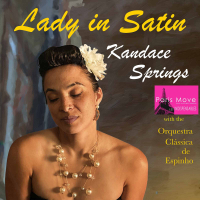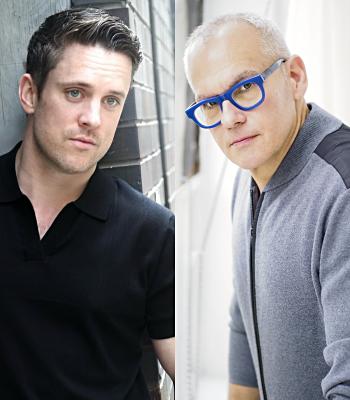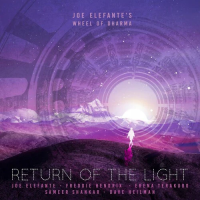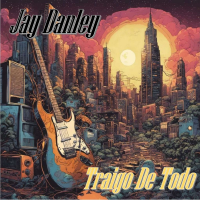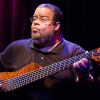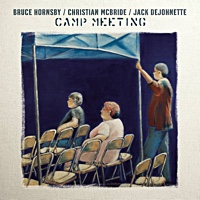Home » Jazz Articles » Evan Parker
Jazz Articles about Evan Parker
Evan Parker: The Ayes Have It

by AAJ Staff
Saxophonist Evan Parker may be best known for his trio improv work with bassist Barry Guy and drummer Paul Lytton. However, he steps out on The Ayes Have It for two separate outings with one-off trio and quartet groups dating from 1983 and 1991.
The first set ("Ayes") documents a set of 1983 London studio recordings with the trio of Parker, bassist Paul Rogers, and exotic percussionist Jamie Muir. Parker seems quite restrained here. He insistently occupies the higher register ...
Continue ReadingEvan Parker/Keith Rowe: Dark Rags
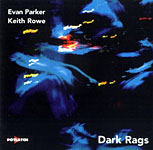
by Mark Corroto
Headlines: The two giants, Evan Parker and Keith Rowe, of British improvisation over the past 35 years, finally get together for this historic duo recording. Rowe, a founding member of AMM along with Eddie Prevost in 1965, has taken the concept of the guitar as an instrument to the most abstract degree. He plays with the guitar on a flat surface, treating it as an electric processor, utilizing feedback and finessed noises for effect. His constructions are at the expense ...
Continue ReadingEvan Parker: The Two Seasons

by Robert Spencer
Evan Parker seems to be coming out with a new recording every month, and they're all good. His improvising is, as it always has been, highly individual and immediately recognizable, but each new disc brings new possibilities and new rewards. This one is a double disc buy a trio that is not Parker/Guy/Lytton. Instead, John Edwards is on bass and Mark Sanders on percussion. The differences are subtle, since Edwards and Sanders are both top-flight free players who well complement ...
Continue ReadingEvan Parker - Electro-Acoustic Ensemble: Drawn Inward

by Glenn Astarita
Drawn Inward represents the second “ECM Records” release of the “Electro-Acoustic Ensemble” led by free jazz icon, saxophonist Evan Parker and featuring Parker’s long time associates, bassist Barry Guy, percussionist, electronics ace Paul Lytton and others who supply the live electronics, processing and samples. What may seem to some as being a science project for jazz improvisers, Drawn Inward commences with a composition titled, “The Crooner (for Johnny Hartman)” who of course was a famous balladeer or crooner, also known ...
Continue ReadingParker / Beresford / Edwards / Moholo: Foxes Fox

by Robert Spencer
Foxes Fox is a relatively rare opportunity to hear master improvising saxophonist Evan Parker in the company of a pianist, although these opportunities are increasing of late: since 1995 he has recorded in a quartet setting with Marilyn Crispell ( Natives and Aliens, Leo) and in duets with Agustí Fernández ( Tempranillo, Nova Era) and George Gräwe ( Unity Variations, Okka). And FMP has just issued a long-awaited new release from the Schlippenbach Trio.
All of those recordings are worth ...
Continue ReadingParker, Rutherford, Schneider & Lytton: Waterloo 1985

by Glenn Astarita
Waterloo 1985 was recorded live at “Le Festival Jazz ET Musiques Improvisees” in Waterloo, Belgium August 17,1985 and features one lengthy piece titled, “Dark Interior”.
This “live date” signifies the British Free-Jazz movement at its best, as Evan Parker (saxophones), Paul Rutherford (trombone), Paul Lytton (perc), and Hans Scnheider (bass) present a case study in improvisation. “Dark Interior” is the lone piece here and clocks in at 61 minutes. The proceedings commence with Paul Rutherford and Evan Parker jabbing, sparring ...
Continue ReadingEvan Parker: Waterloo 1985

by Robert Spencer
The intoxicating spirit of the kind of “free" improvisation that this disc exemplifies comes from the in-the-moment interplay between the players, a microscopic call-and-response activity that creates a music of flows, eddies, tensions, and releases. Over the single hour-long track on this disc, Evan Parker , Paul Rutherford, Hans Schneider, and Paul Lytton play undulating music of otherworldly calm, furious sparks and shards of energy music, death-defying leaps and gear changes: in short, an entire thesaurus of melodic, harmonic, dynamic ...
Continue Reading

